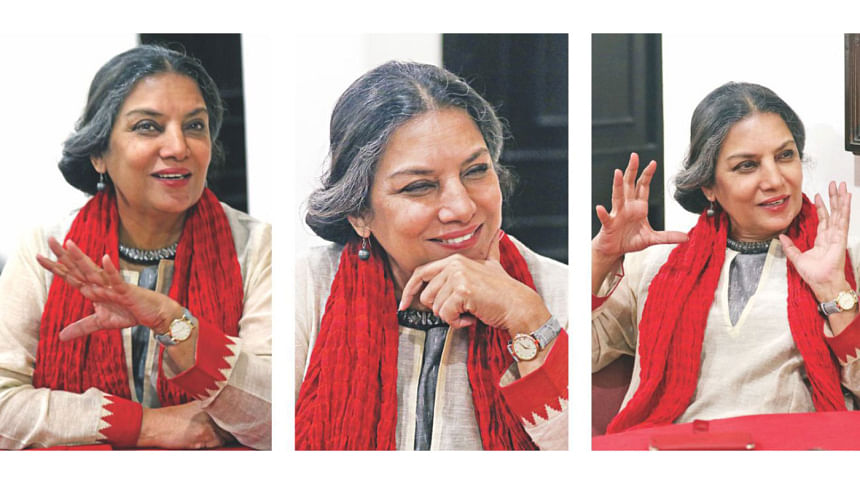THE OTHER SIDE OF THE SILVER SCREEN

Photo: Kazi Tahsin Agaz Apurbo
One does get a little nervous when meeting a famous personality, who they have only previously seen on television and the silver screen. A 20-minute conversation with Shabana Azmi, however, would showcase so much more than films and the 'behind the scenes' sessions. She would, in fact, speak of real people, of developing villages, of both success and failure, and also speak about how storytelling on celluloid is, after all, an inspiration from real life.
Regarded as one of the finest actors in India and in the world, Shabana Azmi has appeared in more than 120 films -- in more than one language. A supporter of women's rights, progressivism and positive social change, many of her films speak her language in terms of social change and betterment of the people. The Goodwill Ambassador of the United Nations Population Fund (UNPFA), Azmi is also a nominated (unelected) member of the Rajya Sabha, the upper house of the parliament in India.
"I have been coming regularly to Dhaka," says Shabana Azmi. A member of the International board of BRAC, Azmi took some time off from the BRAC field visits and meetings she had come to attend earlier last month. "I have tremendous respect for Abed bhai. When he had asked me to be a part of the board I was very surprised and also very flattered. But I didn't know, at that time, the scale of what BRAC does." Referring to Sir Fazle Hasan Abed, the Founder and Chairperson of BRAC, Azmi is in praises of both him and the organisation. "What vision! What foresight! What compassion! What commitment! It (BRAC) continues to overwhelm me!" she says. "I don't think there is a parallel for BRAC anywhere in the world; and to think that it started with just Abed bhai and two other people. I truly believe that Abed bhai should get the Nobel prize. There is no match for the scale of what BRAC does."
Shabana Azmi works in rural India herself and draws similarities between the work she does on regular basis and the work done by BRAC in rural Bangladesh. "I run my own NGO founded by my father, Kaifi Azmi, the Mijwan Welfare Society," she says. Mijwan is a village in eastern Uttar Pradesh, which she also calls her home. "My father believed that if a nation or a society has to make real progress, then we would have to concentrate on the rural areas, especially in our parts of the world. That is where the population lives. We provide education, computer training and employment generation and we are very proud of this tiny little village." Several Indian movie stars are involved with the welfare society and are goodwill ambassadors of Mijwan -- namely, Priyanka Chopra, Aishwarya Rai, Amitabh Bachchan, Jaya Bhaduri Bachchan, Farhan Akhtar and Ranbir Kapoor. "They are all wearing our clothes," adds Azmi. "In fact, Manish Malhotra, the designer has adopted the village, even Naomi Campbell, the famous English model, actor, singer and author wear out clothes. So for us it is a matter of great pride."
Despite the several platforms for education and the numerous movements for equal opportunities, men in our part of the world still feel that they have a right over women, and many women silently accept it. Azmi however says that things will change slowly, to continue with the fight and never give up. "In our part of the world, we live in several centuries," she explains. "Our people in the subcontinent live in the 18th, 19th, 20th, and 21st centuries at the same time. On one hand you have many women in powerful positions of power – politics, corporations, film industry etc. On the other hand female infanticide is still practiced. This is because, it is such a deeply patriarchal society – a boy is privileged at birth just for being male. A woman doesn't get the fair chance to showcase her skills. Patriarchy is so deep rooted that unfortunately men and women both are victims."
Many working towards change for the betterment tend to get frustrated and tired. Results are slow and not all goals are always met on time. "Yes we all go through this all the time, and so do I," says Shabana Azmi. "But that's when I remember what my father had said. He said that when you are working to change, you need to build into that expectation; the possibility that change might not occur within your lifetime and yet if you have the conviction to carry on working with sincerity and commitment, change will come, even if it does so after you are gone. So then there is no place for frustration. This is my mantra for whenever I get frustrated!"

 For all latest news, follow The Daily Star's Google News channel.
For all latest news, follow The Daily Star's Google News channel. 



Comments